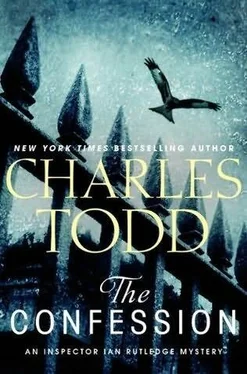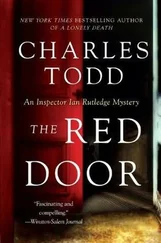Charles Todd - The Confession
Здесь есть возможность читать онлайн «Charles Todd - The Confession» весь текст электронной книги совершенно бесплатно (целиком полную версию без сокращений). В некоторых случаях можно слушать аудио, скачать через торрент в формате fb2 и присутствует краткое содержание. Жанр: Полицейский детектив, на английском языке. Описание произведения, (предисловие) а так же отзывы посетителей доступны на портале библиотеки ЛибКат.
- Название:The Confession
- Автор:
- Жанр:
- Год:неизвестен
- ISBN:нет данных
- Рейтинг книги:5 / 5. Голосов: 1
-
Избранное:Добавить в избранное
- Отзывы:
-
Ваша оценка:
- 100
- 1
- 2
- 3
- 4
- 5
The Confession: краткое содержание, описание и аннотация
Предлагаем к чтению аннотацию, описание, краткое содержание или предисловие (зависит от того, что написал сам автор книги «The Confession»). Если вы не нашли необходимую информацию о книге — напишите в комментариях, мы постараемся отыскать её.
The Confession — читать онлайн бесплатно полную книгу (весь текст) целиком
Ниже представлен текст книги, разбитый по страницам. Система сохранения места последней прочитанной страницы, позволяет с удобством читать онлайн бесплатно книгу «The Confession», без необходимости каждый раз заново искать на чём Вы остановились. Поставьте закладку, и сможете в любой момент перейти на страницу, на которой закончили чтение.
Интервал:
Закладка:
“I kept my part of the bargain,” Rutledge said, without greeting. “I said nothing to Ned Willet. As far as I know, he died at peace. Now I want you to tell me what you know about his son, Ben.”
Setting his mop to one side, Sandy Barber said, “I know nothing about Ben. Or his death.”
“Look. I’m not here to hunt down smugglers-”
“Who have you been talking to?” Barber demanded. “Who told you such a wild tale?”
“I didn’t need to be told. Not after you nearly took a club to me. If you hadn’t killed Ben Willet, there was only one other reason to be afraid of a policeman. Here on the Hawking, France just across the water? The airfield must have been quite a problem. They’d have been patrolling the river and the estuary. You wouldn’t have stood a chance getting past the Coastguard with contraband goods. It follows that someone resumed this business as soon as the airfield was evacuated.”
“I don’t believe you.”
“Suit yourself.”
“And as for murdering Ben Willet, what reason would any of us have to go after him? Look in London. Or Thetford. It would make a hell of a lot more sense.”
“How often did he write to his sister? Or his father?”
“He hardly ever did. We got a letter after he was demobbed, and he said he would get in touch with us again as soon as he’d settled in Thetford. That was that. Ned tried to say he was too busy, but Abigail thought there could have been a girl he was fond of, and he spent all his free time with her.”
“What connection did he have with the Russell family at River’s Edge?”
“He didn’t. Not so far as I know.”
“Then why was he wearing a locket that had belonged to the late Mrs. Russell? With a photograph in it of Cynthia Farraday as a young girl?”
“Good God,” Sandy Barber said blankly, staggered by what he’d just been told.
Rutledge took the slender chain from his pocket and passed it to Barber. The man fumbled with the delicate clasp that closed the locket. Finally, when it lay open in his fingers, he stared at the photograph as if half afraid it would vanish before his eyes.
At last he said, “How do you know the locket belonged to Mrs. Russell?”
“I asked someone who knew her well enough to have seen her wear the necklace every day of her life. It was presumed that she was wearing it the day she disappeared.”
“But there must be dozens of lockets like this one. How can anyone be sure-not after what? Six years? It was the summer before the war began that she died, if I remember right?”
“So I’ve been told.”
“It makes no sense. How did Ben come by such a thing?”
“Who was in charge of the investigation into her death?”
“The family called in an inspector from Tilbury. None of us think much of Constable Nelson. He’s drunk half the time these days and stays in his cottage minding his own business.”
“Then why haven’t you asked for him to be replaced?”
“You know damned well why. Nelson turns a blind eye because he has a taste for French brandy.” There was contempt in his voice. “And better the devil you know…”
“Where can I find Constable Nelson?”
“He lives in a cottage half way down Martyr’s Lane.”
“Can you tell me the name of the family Willet worked for in Thetford?”
“Damned if I know.”
Rutledge couldn’t judge whether he was telling the truth or deliberately being obstructive.
“I’ll speak to Nelson then.”
As he turned to leave, he had the feeling that Barber was about to say something more, but the man thought better of it, and Rutledge let it go.
He’d said nothing about witnessing the smuggling run.
Making what appeared to be an educated guess about the resumption of the contraband trade, even on such a small scale, was one thing-having proof that it still went on was another.
Three short lanes ran north from the High Street, away from the river. Barber himself lived on the nearest of these. The last was Martyr’s Lane. About halfway down it stood a weathered cottage with a bedraggled front garden surrounded by a wrought iron fence sadly in need of paint.
Hamish said skeptically, “It’s no’ verra’ promising.”
Rutledge stopped before the gate for a moment, then reached over, lifted the rusted latch, and made his way up the overgrown path. He knocked several times and finally tried the door.
It wasn’t locked, and he opened it, calling, “Constable Nelson?” as he stepped inside.
The hall was dusty but presentable enough. In contrast, the front room of the cottage looked to Rutledge as if the constable had lived in it. Used dishes sat on every flat surface, a quilt had been thrown over one chair in front of the hearth, and the carpet looked as if it hadn’t been swept in months. A stained and creased shirt had been thrown on the floor, and a crumpled pair of stockings had been tossed into a corner. The desk, where the constable was expected to conduct official business, was littered with teacups, opened tins of fruit, and several pairs of boots in need of polish.
A thick fug-a combination of cigarette smoke, unwashed clothing, and brandy- made him cough.
The room appeared to be empty, and Rutledge was on the point of trying another when his shod foot collided with an empty bottle, sending it spinning under the nearest table. It was then he saw the constable on the floor behind the divan.
His first thought was that the man was dead.
He strode to the constable’s side and knelt to feel for a pulse. Just then Nelson snored raucously, and Rutledge realized that he’d passed out.
The constable lay where he must have fallen, his face turned to the wall, his collar undone, and his tunic unbuttoned. His shirt was stained with food, and his boots appeared not to have been polished for some time, the toes scuffed and dull.
Rutledge rose, and touched the man with the toe of his boot, and none too gently.
“Constable Nelson?”
The man didn’t move.
“Constable Nelson!”
It was the voice of command this time, and Nelson’s body jerked; his lids fluttered and then revealed a pair of bloodshot eyes that could barely focus.
“Who are you?” he demanded in a hoarse croak.
“Scotland Yard. Get to your feet, man, you’re a disgrace to your uniform.”
Nelson tried to rise, fell back, and vomited profusely.
Disgusted, Rutledge said, “I’ll give you an hour. Clean yourself up and present yourself at The Dragonfly. I’ll be waiting.”
He turned and walked out, slamming the inner door and then the outer one, knowing full well the shock to Nelson’s ears.
But it was easy to see what had happened to the man. Shunted aside by the villagers, paid in contraband to eke out his meager resources and keep him too dulled to interfere, and without the strength to stand up for himself in these circumstances, he had accepted his lot. Someone must have seen to it that he was sober and presentable if or when the need arose, or the Chief Constable would have got wind of his condition and replaced him long since.
The question was, even fully sober, could Nelson still function?
Hamish said, “More to the point, he wouldna’ be trusted by the ithers.”
There was that as well.
Rather than return directly to the inn to wait, Rutledge made a detour to Barber’s house. He could see the black crepe that had been hung over the door, and several neighbors were just leaving, embracing Abigail Barber as they stepped outside. Behind them, the rector was preparing to leave also. As Rutledge approached, he heard Morrison asking a last question about the service for Ned Willet, and from the shadows of the front room someone answered. He could see the outline of a head and broad shoulder, but not the face. It wasn’t Barber. He was nearly certain it was the man he had seen twice before, once when he had come to Furnham with Frances, and once when he had tried to find someone willing to identify the photograph of Ben Willet. Whether he had been one of the smugglers coming up from the river in the middle of the night, Rutledge couldn’t be sure under oath, but he had a strong feeling he had been.
Читать дальшеИнтервал:
Закладка:
Похожие книги на «The Confession»
Представляем Вашему вниманию похожие книги на «The Confession» списком для выбора. Мы отобрали схожую по названию и смыслу литературу в надежде предоставить читателям больше вариантов отыскать новые, интересные, ещё непрочитанные произведения.
Обсуждение, отзывы о книге «The Confession» и просто собственные мнения читателей. Оставьте ваши комментарии, напишите, что Вы думаете о произведении, его смысле или главных героях. Укажите что конкретно понравилось, а что нет, и почему Вы так считаете.












